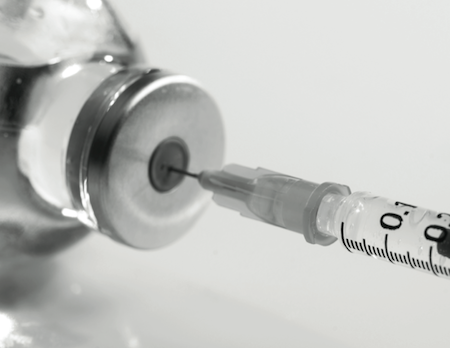January 23, 2015

The HPV vaccine is proven to prevent strains of the virus known to cause several forms of cancer, including cervical cancer.
Sponsored By:

Also see below: What is Human Papillomavirus? and Quick Vaccination Facts
Cancer touches everyone. But, an important tool in the fight against several cancers – particularly cervical cancer – is being woefully underused. That tool is the Human Papillomavirus (HPV) vaccine. In fact, less than half of the target population ever received this life-saving vaccine.

Tom Murwin, M.D.
“Getting the vaccine in before a child is infected prevents the initial infection that subsequently will lead to cancers,” says Dr. Tom Murwin, pediatrician at Dean Clinic – Stoughton.
The Centers for Disease Control (CDC) reports that over a four-year period, strains of HPV were associated with about 33,200 cancers in the United States. HPV is thought to be responsible for more than 90 percent of anal and cervical cancers, approximately 70 percent of vaginal and vulvar cancers, and more than 60 percent of penile cancers. The virus responsible for these cancers is so prevalent that most women and men will contract at least one strain of the virus at some point in their lives. But most are not vaccinated.
Originally, the vaccine was only available for preteen girls. Now, the CDC recommends that both boys and girls between the ages of nine and 21 are vaccinated against HPV, preferably before the onset of sexual activity, since that is the most common way HPV is transmitted.
“Getting the vaccine in before a child is infected prevents the initial infection that subsequently will lead to cancers,” says Dr. Tom Murwin, pediatrician at Dean Clinic – Stoughton. “Once you are infected with the human papillomavirus, the vaccine doesn’t do anything. So it is important to get the vaccine before infection happens. If a female gets all three doses before she is infected with the virus, her lifetime risk of cervical – and other vaginal or vulvar – cancers is reduced by 70 percent. This also means 70 percent fewer abnormal Pap smears, 70 percent fewer follow up doctor appointments and 70 percent fewer procedures to stop pre-cancers from becoming invasive cancers.”
The vaccination process itself is not unlike many other childhood vaccinations. Both boys and girls can receive the vaccination as early as age nine. In total, three doses of the vaccine will be administered by your doctor’s office over a six-month period. Part of the reasoning behind early vaccination against HPV is that it will allow a young person’s body to build up proper immunity to the virus, before sexual activity could put them at risk for contracting a strain of HPV. The development of such a powerful cancer prevention tool should make parents take notice, says Dr. Murwin.
“For the first time in the history of medicine, we now have an incredibly safe vaccine that can prevent 70 percent of cervical cancer with three injections,” he says. “The earlier the vaccine is given, the more likely it is to be effective in preventing those cancers. It’s a real medical breakthrough. Some parents and family values groups voice concerns that vaccinating against a virus that is generally considered a sexually transmitted infection will lead to earlier sexual activity. Research shows this common misconception is simply not true. Others are worried about potential side effects. According to studies of the HPV vaccine, the biggest side effect is pain at the site of the vaccination. Because of this pain, some people may faint. Since the vaccine was first made available in 2006, there have been no reports of serious side effects like ovarian failure, death, stroke or other negative effects scientifically linked to the vaccine. While claims of these side effects have been publicized in the media, investigations into these claims have found them to be scientifically unfounded.
Because of some controversy surrounding the vaccine, there is now a large push to help educate parents more fully when it comes to having children vaccinated against HPV. Doctors across the country are being urged to recommend these vaccinations, but if your child’s physician doesn’t bring it up, you should. As an advocate for your children, it’s important to ask questions about what vaccinations are recommended for your child even beyond those vaccinations required for school.
Dr. Murwin stresses to parents that avoiding or delaying the HPV vaccine increases their child’s risk of developing an HPV-associated cancer. “HPV vaccine is an anti-cancer vaccine. We all get exposed to HPV,” he says. “If you wait and your child or teen is infected, they have lost the chance to reduce your child’s cancer risk.
If you are a young adult but haven’t been vaccinated, you can still receive the vaccine. The CDC has approved the use of the vaccine for men and women up to the age of 21. The process is the same and vaccination beyond childhood could still prevent cancers and other health issues caused by HPV.
Knowing that the vaccine is safe and effective is a big message many doctors, including Dr. Murwin, hope parents and young adults take to heart.
“I have given the vaccine to my children and hope others do as well,” says Dr. Murwin. “Let me illustrate the potential benefits of human papillomavirus vaccination among girls currently 12 years or younger in the United States: if we gave it to every 12 year old girl over the next few years and we raised vaccine coverage of young girls to 80 percent, we could avoid 53,300 lifetime cervical cancer cases over the lives of those 12 year old girls.”
Human Papillomavirus – or HPV – is the most common sexually transmitted infection. In fact, HPV is so common that nearly all sexually active men and women will contract one of the 30 sexually transmitted strains of the virus. While many of these strains do not have any signs or symptoms, others can cause genital warts and a variety of cancers including cervical cancer.
You can contract HPV by engaging in sexual activity – including oral sex – with someone who has the virus. HPV can be spread even when an infected person has no signs or symptoms of the virus. Because HPV can remain in your system without any symptoms for years, it can make it difficult to know when you first contracted the virus. HPV is diagnosed through a medical history and physical exam. Most women are diagnosed with HPV based on an abnormal Pap test. Currently, no HPV tests are available for men.
While most cases of HPV can go away on their own, others can cause serious health problems including genital warts and cancer. Cancers often take years or even decades to develop after a person first contracts HPV. There is no way to know which people with HPV will develop cancer or other health problems, which makes vaccination against HPV a vital tool in preventing HPV-associated cancers.
Dr. Murwin stresses that it’s important for families to know the facts when it comes to HPV vaccination. Take a look at who can receive the vaccine, facts about its effectiveness and how your child can be vaccinated:
- The HPV vaccine is recommended for boys and girls ages 9-21.
- The vaccine is known to prevent 70% of cervical cancers and 90% of genital warts.
- The vaccine is considered to be very safe by medical professionals. The most common side effect is pain at the site of the vaccine injection.
- Access to the HPV vaccine is easy: ask your health care professional.
- Vaccination protocol calls for three doses of the vaccine over a six month period.
- Most insurance companies cover the cost of an HPV vaccine. Local health departments and family planning clinics also offer the vaccine at a low cost.

